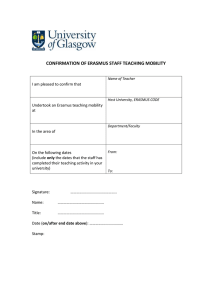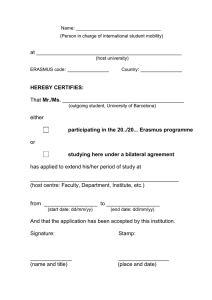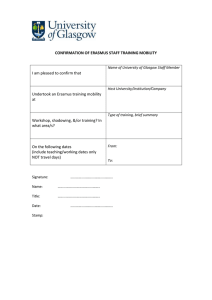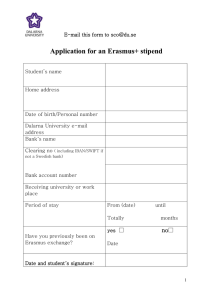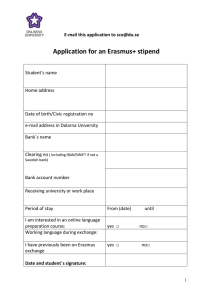Vocational education and training brochure
advertisement
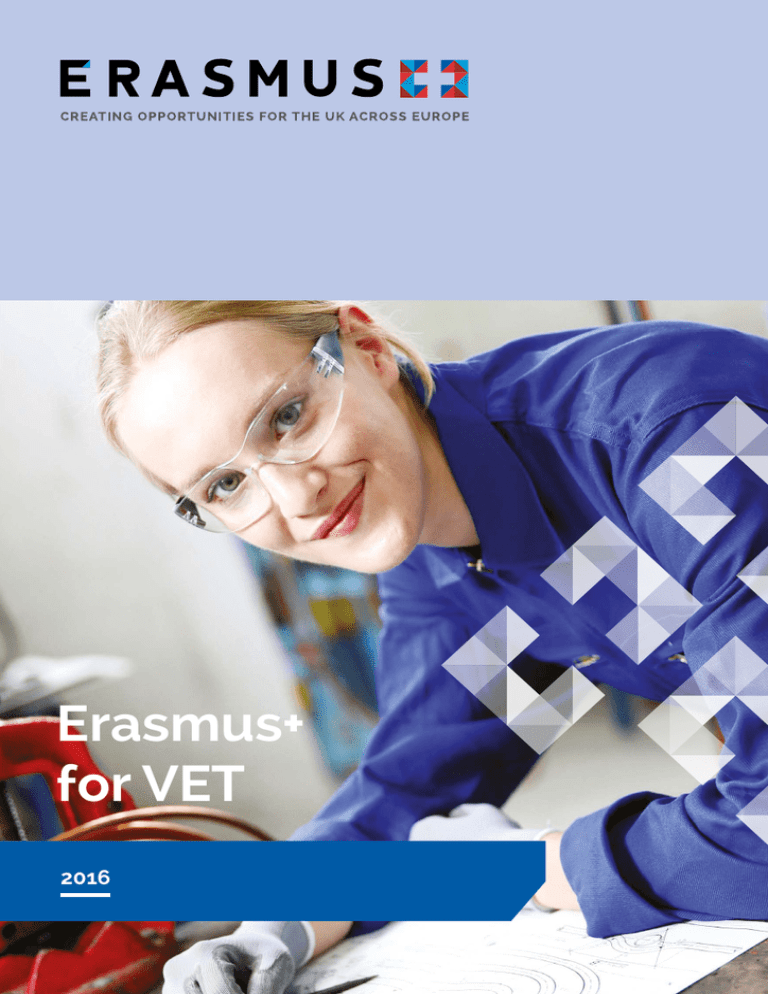
Erasmus+ for VET 2016 2 Erasmus+ for VET About Erasmus+ Erasmus+ is the European Union programme for education, training, youth and sport. It runs for seven years, from 2014 to 2020, with organisations invited to apply for funding each year to undertake unique and worthwhile activities. Erasmus+ succeeds the Leonardo programme which previously provided European funding for vocational education and training (VET). Erasmus+ in the UK is under the authority of the Department for Business, Innovation and Skills (BIS), and is managed by the UK National Agency, a partnership between the British Council and Ecorys UK. Changing Lives, Opening Minds Through Erasmus+ organisations can enable learners and staff to pursue stimulating opportunities for learning across Europe. Participants will gain valuable life-skills and international experience to help them develop personally, professionally and academically. As well as boosting skills and employability for participants, the programme will also aid modernisation in the VET sector across Europe and enhance the international dimension of education and training. 3 Key facts and figures Over its lifetime, Erasmus+ has an overall budget of €14.7 billion for the development of knowledge and skills. A proportion of this budget is allocated to provide funding for vocational education and training (VET) projects. Other (8.8%) Sport (1.8%) Jean Monnet (1.9%) Youth (10%) VET (22%) Higher education (43%) Education & Training Education and training (77.5%) Schools (15%) Adult education (5%) Unallocated (15%) With this funding, by 2020, the European Union aims to support: • 800,000 lecturers, teachers, trainers, education staff and youth workers to teach or train abroad; • 25,000 partnerships, involving 125,000 organisations, to implement joint initiatives and promote exchange of experience and know-how and links with the world of work; • 650,000 vocational apprenticeships or traineeships abroad. www.erasmusplus.org.uk 4 Erasmus+ for VET What can I do? There are a number of different funding streams available under Erasmus+ for which UK organisations involved in vocational education and training (VET) can apply. VET funding is split into two main areas: • Funding for VET learner and staff mobility. This activity is known as Key Action 1 of Erasmus+ and; • Strategic Partnerships funding for organisations to develop provision though working in partnership. This is known as Key Action 2 of Erasmus+. Information on all VET funding opportunities can be found on our website at: www.erasmusplus.org.uk/vocational-education-and-training-funding 5 Mobility for VET learners and staff (Key Action 1) Teaching or training abroad If you work or study in VET, Key Action 1 is the funding strand that applies to you as an individual. It is about mobility, which means that you spend time abroad. Mobility projects can cover one or more of the following: learner mobility or staff mobility. Overall, projects last from between 1 to 2 years, but an individual mobility activity can vary based on the types of project. The aim of Key Action 1 is to fund opportunities for individuals to improve their skills, enhance their employability and gain cultural awareness. Mobility projects are transnational, and so must involve at least two organisations – your own organisation and the organisation(s) abroad. Recent graduates of a VET school or company, such as former apprentices, can also take part in mobility opportunities. This is providing the Erasmus+ training placement takes place within one year of graduation. A VET learner mobility activity is a traineeship abroad. The duration of the traineeship placement can be between 2 weeks and 12 months. www.erasmusplus.org.uk 6 Erasmus+ for VET Types of VET staff mobility include: • Teaching/training assignments for staff of VET schools to teach at a partner VET school abroad; • Staff training where VET staff undertake a work placement or a job shadowing/ observation period in an enterprise or other VET organisation abroad. Staff mobility activities can last from 2 days to 2 months, excluding travel time. In the case of teaching and training assignments, staff from enterprises, public sector and/or society organisations may also participate. For both types of mobility funding the organisations apply, as grants are not available directly to individuals. Funding An Erasmus+ grant is intended as a contribution to the costs of a project and may not cover the total cost. Funding will come in the form of a unit cost or (a percentage of the) real cost. You could receive the following funding per participant: • Travel – contribution to the travel costs of participants, including accompanying persons, from place of origin to the venue of activity and return. • Organisational support – costs which are linked to the implementation of mobility activities, such as preparation, monitoring and support of participants during mobility. • Individual support – linked to covering costs for food and accommodation for participants and accompanying persons. • Special needs support – specific additional amounts for participants or accompanying persons with a disability or specific needs. • Exceptional costs – additional costs to support the participation of learners with fewer opportunities • Linguistic support – costs to support VET learners before their mobility with the language they will come into contact with during their placement abroad. Please note this is not available for languages other than English, French, German, Dutch, Spanish and Italian. 7 Strategic Partnerships (Key Action 2) Working with other VET organisations UK organisations involved in vocational education and training can take part in collaborative projects aimed at improving VET provision, either as the lead organisation or as a partner. The Strategic Partnership funding strand applies here. Projects can last for 2 or 3 years, and must include at least three partners from three different countries, including the organisation that is making the application. The lead organisation applies to the Erasmus+ National Agency in their county for funding on behalf of the project as a whole. A maximum of €150,000 is available per project per year. The aim is to focus on activities designed to improve VET provision across the participating countries. Working with organisations in other sectors You can also work with organisations in sectors other than VET including higher education, adult education, schools, sport and youth. The funding strand is still Key Action 2 and must include at least three partners from three different countries. www.erasmusplus.org.uk 8 Erasmus+ for VET This Strategic Partnership activity could include: • Developing, testing and implementing innovative approaches and practices for VET trainees, staff and organisations. • Recognition of skills and competences. • The encouragement of active citizenship and entrepreneurship. • Credit transfer (such as ECVET) and quality assurance (EQAVET), training, teaching and learning activities such as blended mobility of trainees, joint staff training events and teaching and training assignments. Funding An Erasmus+ grant is intended as a contribution to the costs of a project and may not cover the total cost. Funding will come in the form of a unit cost or (a percentage of the) real cost. Depending on your project, funding could cover: • Project management and implementation – this relates to the organisational, management and implementation of the project. • Transnational project meetings – this is for day to day costs such as accommodation and travel to meetings. • Intellectual outputs – grants paid per participant per working day by each country per group. • Multiplier events – covers of events aimed at disseminating the intellectual outputs of a project. • Special needs support – specific additional costs for participants with a disability or specific needs. • Exceptional costs. 9 www.erasmusplus.org.uk 10 Erasmus+ for VET Online resources Before, during and after your Erasmus+ project, there is a wealth of free online information and resources to support you. Europass – Europass supports individuals to make their skills and qualifications clearly and easily understood in Europe. This is achieved by both freely accessible documents completed by the individual and by documents including certificates issued by education and training authorities. www.europass.cedefop.europa.eu Online Linguistic Support – The Erasmus+ Online Linguistic Support (OLS) has been designed to provide language assessments and courses for Erasmus+ participants and aims to improve their knowledge of the language in which they will work, study or volunteer abroad so that they can make the most out of this experience. erasmusplusols.eu/ ECVET – The European Credit System for Vocational Education and Training (ECVET) is a technical framework to facilitate the transfer, recognition and accumulation of assessed learning outcomes with a view to achieving a qualification. Experts from each UK country are available to provide organisations in the UK practical support and training for ECVET. www.ecvetexperts.org.uk EQF – The European Qualifications Framework (EQF) is a translation tool that helps communication and comparison between qualifications systems in Europe. EPALE – The Electronic Platform for Adult Learning in Europe is a multilingual open membership community for teachers, trainers, researchers, academics, policy makers and anyone else with a professional role in adult learning across Europe. ec.europa.eu/epale/en 11 Why take part? Erasmus+ activities have positive results for both organisations and individual members of staff. The chance to spend time in another European country on a traineeship, teaching, job shadowing or on a partnership visit enables learners and staff to broaden their horizons. Learners are able to build employability skills to help them make the transition into the world of work, as well as improving their soft skills and cultural awareness. Erasmus+ activities make staff feel valued. The chance to spend time in another European country means they also return refreshed, energised and more motivated, helping to retain valued staff. The framework of your Erasmus+ activities can also link to your organisation’s own strategic vision. www.erasmusplus.org.uk 12 Erasmus+ for VET Case studies Derby College (Key Action 1) Integration, enrichment and enterprise Derby College has the largest European Lifelong Learning Programme in the East Midlands. Building on this experience, this project encourages participants to consider different progression routes through training placement opportunities overseas. In total 100 learners and staff from Derby College studying a range of vocational subjects will visit Estonia, Finland, Germany, Sweden and Denmark. The project uses a NCFE Level 2 Award in Developing Enterprise Skills module supported by specialist work placement opportunities that provide real-world work experiences. Students explore different approaches to enterprise, commerce and entrepreneurship in each country aligning with the organisation’s overall strategy of employability and enterprise skills embedded in the college’s curriculum. The first students recently returned from their placements in Finland (during which the temperatures were as low as -27°C!). Tourism students joined the Sampo Icebreaker ship in Lapland for tourists to see the spectacular local scenery and swim in the frozen waters. I am pleased Derby College was able to offer this once-in-the-lifetime “opportunity to learners... to participate in the mobility to Lapland, Finland and learn about the life and culture of this amazing country as well as develop new language skills and gain valuable work experience in their relevant vocational fields. Kadri Saat, Project Co-ordinator ” 13 Leeds City College (Key Action 2) V-Game In today’s digital economy, improving programming skills for young people has been recognised as a priority in the UK and Europe. The Strategic Partnership project led by Leeds City College aims to achieve this. The project is creating the ‘V-Game’ based learning environment. Partners across Europe (from Estonia, Greece, Italy, Malta, Romania and the UK) are creating the game-based learning environment to boost interest among students to learn the technical features of programming. From HTML to Javascript, the game enables players to gain and apply skills that work towards modules in web production and client customisation on students’ Level 3 courses. The project involves VET students between 14-18, trainers, employers and awarding bodies to ensure job market and academic requirements of a National Diploma Level 2/3 qualification are met. Students have been actively involved, contributing to the content of the market needs analysis and all the partnership engaged students in the ideas for characters, settings and genre of the game. The game will be supported by an e-Learning platform which will be set up during the project and include training materials on how to use the V-Game. is giving students, studying Creative Computing at Leeds “CityV. Game College a unique opportunity to be involved in all aspects of game development from Market Needs Analysis, design, functionality and to testing. Along with students from V. Game partner countries, the impact of student consultation, testing and feedback is driving the design, genre, playability and overall quality of the game. In Leeds City College, the finished game will be used as a learning tool, so to have student involvement and direction in these early stages is invaluable both for the students own learning and the suitability and relevance of the finished game for its target users. Gina Yates, Transnational Partnership Manager ” www.erasmusplus.org.uk 14 Erasmus+ for VET How to apply A step-by-step guide to applying 1 Be an eligible UK organisation Any public or private organisation active in the field of VET in the UK, or co-ordinator of a VET consortium, can apply for Erasmus+ VET funding. 2 Review your organisational and financial capacity As part of your application you will need to demonstrate that you have the capacity to successfully administer and deliver your Erasmus+ project. 3 Decide on your project Decide on a project for your organisation based on the activities allowed under a Key Action. 4 Register on ECAS and obtain your PIC Create an ECAS account and register in the Participant Portal to obtain a nine digit PIC (Participant Identification Code) which you and your partners will need in order to complete the eForm. 15 5 Fill out the eform Choose the correct eForm for your sector, key action and funding round. Ensure you have enough time to do this, check that all fields are correctly filled out and validate the form. Only then will you be able to submit. 6 Check the deadline and dates Check and double-check the deadline and the time for submitting your online application form. Also check the project start and end dates. Applications submitted after the deadline will not be accepted. Visit: www.erasmusplus.org.uk/vocational-educationand-training-funding for more information. www.erasmusplus.org.uk 16 Erasmus+ for VET How to apply Top tips For Erasmus+ VET funding there are two application deadlines in a calendar year. You will need to apply online using the electronic application form (or ‘eForm’) for the relevant Key Action for your project, so it is vital that you download the correct form. In all cases, the application must be made by the organisation, not the individual. There is an additional deadline for organisations wishing to apply for the VET Charter. There are limits to the number of separate applications your organisation can submit. Please refer to the Erasmus+ programme guide for full details. Five top tips: 1. Whether you have been successful or unsuccessful in applying for funding for a project, you can still apply for another project in the next funding Round. 2. Start your application well before the due date, in case there are any issues with IT on deadline day. 3. When your PIC is entered into your application form, your organisation’s details will be entered automatically. If these appear to be incorrect you should update the data in the Participant Portal. 4. Look out for webinars and telephone advice sessions run by the National Agency to support you in making your application. 5. Feeling confused by the jargon? Visit www.erasmusplus.org.uk/glossary for a glossary of terms. Read more top tips at www.erasmusplus.org.uk/toptips 17 www.erasmusplus.org.uk 18 Erasmus+ for VET Support from the UK National Agency Whether you are new to the programme, or have applied before, at the UK National Agency we are here to support you all the way, from application guidance, through to managing your project. • Erasmus+ briefing sessions – these are aimed at newcomers, and take place each autumn in locations across the UK. • Guides for applicants – for each Key Action and sector, we provide additional application guidance documents, available to download from our website. • Application support webinars – sign up to these online events including a Q&A session for more detail on the application process in the run up to the funding deadline(s). • Advice sessions – you can call or email us for specific advice about completing your application and we may also occasionally run extra advice webinars or events. Visit www.erasmusplus.org.uk/events for upcoming events. Funding deadlines Deadlines are announced by the European Commission during each annual Call to Apply but can change, so please visit www.erasmusplus.org.uk/deadlines 19 Contact us The UK National Agency is a partnership between the British Council and Ecorys UK. This page sets out how you can contact us for advice and guidance on Erasmus+. Enquiries on VET funding T: 0121 212 8947 E: erasmusplus@ecorys.com Erasmus+ www.erasmusplus.org.uk @erasmusplusuk www.facebook.com/ukerasmusplus www.erasmusplus.org.uk Erasmus+ is the European Union programme for education, training, youth and sport. The Erasmus+ UK National Agency is a partnership between the British Council and Ecorys UK. VET 2016/A
